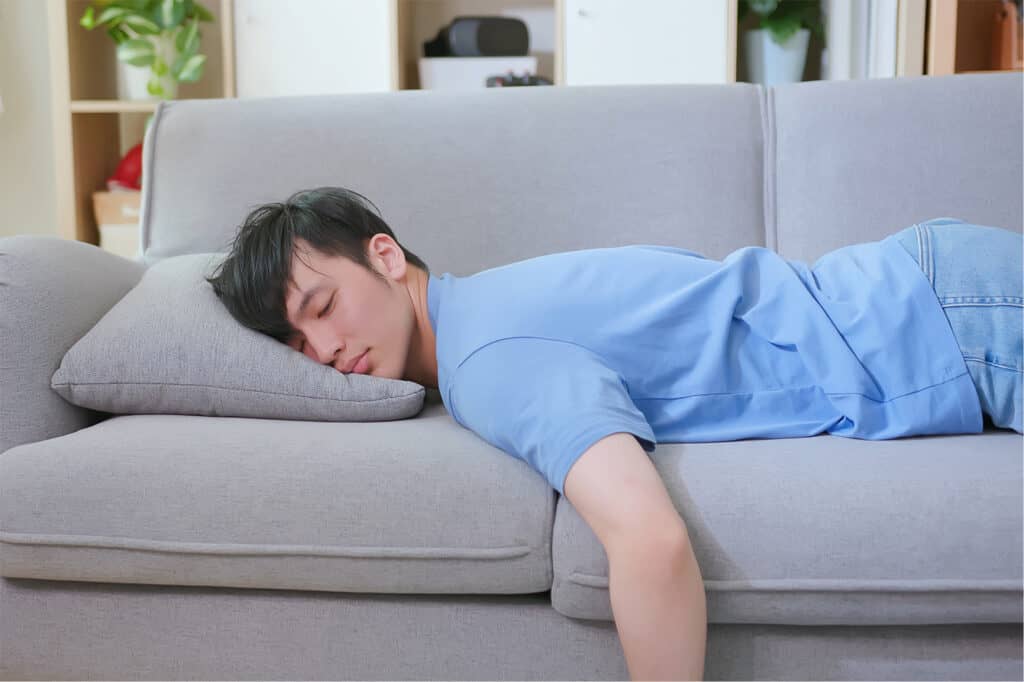Sleep. It’s the thing we spend one-third of our lives doing.
And with good reason.
When we sleep, our bodies do the important work of supporting our brain function and maintaining our physical health. Yet, many of us don’t prioritise it enough, often sacrificing sleep and clocking in less than the recommended amount of seven hours of sleep a night.
Reasons for not sleeping enough can include ‘revenge bedtime procrastination’, a phenomenon where individuals deliberately delay sleep to reclaim perceived lost personal time. Busy lifestyles – the need to get up early and work late – is also another factor.
Sleep deprivation – It all adds up
And it comes as no surprise that the lack of sleep comes with consequences.
Studies reveal that those with chronic sleep deprivation are more prone to colds and produce fewer antibodies after vaccination, and insufficient sleep significantly weakens the immune system, increasing susceptibility to both short-term illnesses like colds and flu. While you can combat symptoms of flu and cough and cold with medications like Chlorpheniramine, Iliadin Nasal Drops, Simtec and Zyrtec-R, getting enough sleep is key to maintaining good health.
Sleep deprivation can also lead to long-term chronic conditions such as diabetes and cardiovascular disease. This is due to sleep deprivation’s disruption of normal immune function, including impaired cytokine production and T-cell activity, leading to persistent, low-grade inflammation.
This chronic inflammation, which fails to recede overnight in sleep-deprived individuals, contributes to a range of health issues, including depression and potentially exacerbating cancer. Crucially, the immune system doesn’t adapt to chronic sleep loss, meaning the negative effects accumulate over time, further jeopardising long-term health.
How to get better sleep
So it stands that having a lack of sleep can have far-reaching consequences. How do we get back on track, sleep-wise? We explore some sleep tips.
1. Increase daytime bright light exposure
Spending time in natural sunlight can keep your circadian rhythm healthy, and improve your daytime energy and nighttime sleep quality.
If you don’t get out much, you can also use artificial bright light devices or bulbs.
2. Reduce evening blue light exposure
Blue light from smartphone and computer screens can reduce melatonin, a hormone that relaxes you and helps you get deeper sleep. One way to avoid this is to limit screen time two hours before bed.
3. Avoid late-day caffeine
Caffeine can reduce your total sleep time and even affect your REM sleep. Try to limit caffeine intake, especially within 8 hours of bedtime. You can also consider decaffeinated alternatives.
4. Limit irregular or long daytime naps
Sleeping in the daytime can confuse your internal clock, and mess up your sleep at night. Take short power naps instead.
5. Maintain consistent sleep/wake times
Your body has a rhythm, and disrupting it can have an adverse impact on your sleep schedule. Practice going to bed and wake up at the same time daily in order to promote a regular circadian rhythm.
6. Avoid alcohol before bed
Alcohol can disrupt hormone levels and sleep patterns, causing or increasing snoring and sleep apnea. Consider avoiding drinks near bedtime.
7. Invest in a comfortable bed and bedding
Optimise your bed quality for better sleep. Choose a supportive mattress and comfortable bedding and consider the material of the bedding for optimal temperatures.
8. Optimise bedroom environment
Your bedroom also plays a part in your sleep quality. Try to maintain a cool, dark, and quiet room and improve air quality by increasing ventilation or using air purifiers.
9. Avoid late-night meals
Eating late can impact your sleep quality. Try to eat dinner several hours before bedtime and limit late-night snacks.
10. Limit liquids before bed
While hydration is important, frequent trips to the toilet can affect your sleep. Consider reducing fluid intake 1-2 hours before sleep and use the bathroom right before bed.
In essence, sleep is not just a period of rest; it’s an active process that supports and strengthens your immune system. By prioritising quality sleep, you can bolster your body’s defences and promote overall health and well-being. Sweet dreams!
Don’t sleep on a convenient way to address your ailments. Enjoy Dr Kart’s convenient virtual medical consultations and support your health journey. Accessible, affordable and time-saving services are here for you – right when you need it.
Find us at Shell Station at 9 Tampines Avenue 2!




